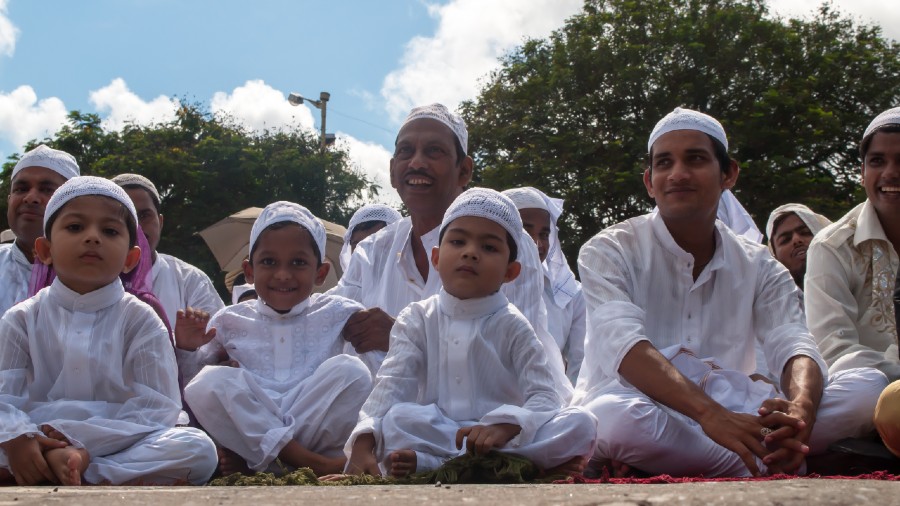The moon says it’s Id-ul-Fitr but the faithful are in no mood to celebrate. The group namaz, the new clothes, the lavish feasts are all to set to fade away the second time in consecutive years because of the pandemic.
“Eid is a sort of reward to us for fasting the month and is meant to be a celebration, so we cannot mourn on the day. But how can we enjoy when so many people are ill or grieving the death of someone?” asks Saba Ahmed, a resident of Uniworld City.
Last year, the country was in lockdown during Id, “but this year the cases are closer to home and the mortality rate is much higher. Id is going to be sombre this time,” Ahmed adds.
Residents said they would keep it simple. “Previously we would offer namaz with others at Nazrul Park but this time neither will we go anywhere nor invite anyone over,” says K.Z. Islam of FE Block. The only silver lining is that his joint family of 13 people are together for Id after many years. “Even those living in different cities have come back and are working from home now. So we look forward to eating a meal together.”
Community namaz
The community namaz mentioned by Islam would be organised by Harmony Association of Salt Lake & New Town but since last year they have stopped public gatherings. “Everyone is scared. This year only one person called to ask if we would have the public prayer and I told him otherwise,” says Nurul Haque, a retired IAS officer and president of the body. No online meet is planned either.
Their secretary Irfan Asad succumbed to Covid last year. “We were just thinking of holding an annual general meeting to elect a new secretary when the second wave came afresh. We have put it on hold,” said Haque, a KB Block resident who will be leading the namaz at home on Id morning with his wife.
A housing complex in New Town, however, will be arranging Id namaz in their prayer hall. Arena Housing in BA Block was developed by the West Bengal Minority Development and Finance Corporation and houses about 180 Muslim families. “There are plans to hold prayers for less than 50 people in a socially distanced way,” said Hammadur Rahaman, a resident who is a doctor currently working at the Covid satellite facility of Medica Superspeciality Hospital.
Residents, Rahaman said, have by and large been told to offer prayers at home. “Some are leaving to spend the occasion at their ancestral homes in the districts. In case more people want to come to the hall, a second batch will be held. Our resident maulavi sahib, Mufti Mohammed Asif, will conduct the prayer,” he said.
No mood for celebration
For children, Id is the most awaited festival of the year. “We wear new clothes, meet cousins, watch movies, eat delicious food and get ‘Idi’, which is money gifted to children by relatives,” says Ammara Khan, a Class XII student, longingly.
Salman Khan’s Id release this year is Radhe, and Ammara and her friends would have gone for it, if it wasn’t for the pandemic. “We might see it online (on Zee5). I’ll take a break from studying this Id, wish others over the phone but the festival won’t be as enjoyable as before,” says the Uniworld City resident.
Some households said they may make biriyani while others said paratha-chicken chaap would be as far as they would go. The traditional sewaii, however, is a must.
Ahmed has no heart to shop for clothes. “Some of us are buying clothes for the kids but we adults are just not in the mood. I’m not buying bangles or applying mehndi this time,” she sighed.
Prayer above all
“Instead of celebrating, let’s pray and serve the needy,” says Shamir Isha, art historian and history professor who has lost his father to Covid-19. “Service is one of prophet Mohammad’s greatest teachings and anyone who calls himself a Muslim should donate food, clothes, medicines to the needy in the pandemic.”
Naushaba Kausar of Sunrise Greens in New Town says Id parties and stage events are all man-made additions to the auspicious occasion. “The scriptures say that the most important part of Id are namaz, gratitude and praise to Allah. And while it is recommended that Id namaz be offered in an open area, it can be offered in any place clean.”
Kausar adds how the scriptures ask people not to leave or enter a city where a plague has broken out. “We are in a similar pandemic now and being asked to self-isolate. So by staying away from public namaz, we are following the holy books, which in itself is a form of worship,” she smiles. “And if you really miss biriyani, like I did last Id, order it through a delivery app.”
Additional reporting by Sudeshna Banerjee











